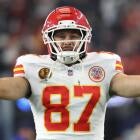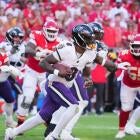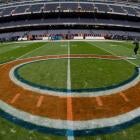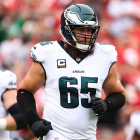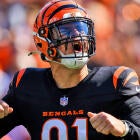Cowboys defense vs. Eagles offense takes center stage in Week 6 'SNF' battle for first in loaded NFC East
Jalen Hurts and the unbeaten Eagles face a stiff test against the Cowboys on 'Sunday Night Football'

The NFC East was not supposed to be this good at this point of the season. Especially not after Dak Prescott was injured in an embarrassing Week 1 loss. Alas, the East has three teams sitting at 4-1 or better after five weeks. Two of those teams will square off, when the 5-0 Philadelphia Eagles play host to the 4-1 Dallas Cowboys for the Week 6 edition of "Sunday Night Football."
This matchup pits two of the best units in the league against each other. Philadelphia's offense ranks fifth in the NFL in both TruMedia's version of EPA per play and Football Outsiders' DVOA, while Dallas' defense checks in fourth in EPA and sixth in DVOA. Those outfits are powered by position groups that rank among the small handful of best in the league: Philadelphia's offensive line and Dallas' defensive front. The Eagles so far rank first in Pro Football Focus' pass-blocking grade and 11th in run-blocking, while the Cowboys rank first in pass-rush grade and lead the NFL in pressure rate (42.1%) by a mile. (They also rank 23rd in blitz rate. When they blitz, they're getting pressure on 50% of snaps. When they don't, it's a still-league-best 39.8%.)
Unfortunately, the battle in the trenches does seem likely to be at least somewhat affected by injuries. Jordan Mailata, Landon Dickerson, Isaac Seumalo, and Jason Kelce all dealt with issues during last week's game against the Cardinals, and have been limited in multiple practices this week. The same is true of Micah Parsons and Demarcus Lawrence, while safeties Jayron Kearse and Donovan Wilson -- who often function as pseudo-linebackers -- practiced in full but are still listed on Dallas' injury report. All of those players seem somewhere between highly likely and guaranteed to play, but they may not be at full strength. Still, this should be a fascinating matchup on which to focus.
Cowboys defensive coordinator Dan Quinn is doing a better job than almost any coach in the NFL of generating one-on-ones and other favorable situations for his rushers, varying his fronts and alignments and generally making sure you don't know who is coming, or when, or from where. Quinn is very smartly using Parsons to rush the passer far more often this season than he did a year ago, when the rookie was an efficiency monster racking up huge stats despite rushing at a significantly lower rate than other elite defenders. He ranked 120th in the NFL in pass-rush snaps and still finished sixth in sacks and ninth in total pressures, so this year, Quinn has ramped up the rate at which he sends Parsons after the quarterback.
| Year | Pass Rush % | Coverage % |
|---|---|---|
| 2021 | 51.8% | 48.2% |
| 2022 | 85.3% | 14.7% |
It also helps that Dallas has not just Parsons, but Lawrence, Dorance Armstrong, and Osa Odighizuwa playing at an extraordinarily high level for a high volume of snaps. Parsons ranks second in the NFL in pressure rate (17.7%) behind only Nick Bosa, while Lawrence (15.4%) ranks 11th, Armstrong (12.6%) ranks 27th, and Odighizuwa (12.1%) ranks 32nd. That's out of 102 players who have rushed the passer at least 100 times this season, according to TruMedia. Lower the qualifying threshold and players like Dante Fowler (14.6%) and Sam Williams (13.3%) also fare quite well.
The handful of snaps per game where Parsons and Lawrence rush off the same side of the defense seem genuinely unfair to opposing offensive lines.
If there's any unit that might be equipped to handle all this, though, it's the Eagles' offensive line. As previously mentioned, the unit ranks first in the NFL in pass-blocking grade this season, while a very-respectable seventh in ESPN's pass-block win rate. The Eagles have elite or near-elite players at center (Kelce) and both tackle spots (Mailata and Lane Johnson), and both of the guards are average to above-average. Lawrence and Johnson have had plenty of battles over the years since Lawrence tends to rush from the left side of the Dallas defensive line, and they should be fun to watch on Sunday night as well. Mailata vs. Armstrong should be fascinating on the opposite side, particularly given how good Armstrong has been at converting speed to power this season. Mailata is 6-8, 365 pounds, so it's quite difficult to do that against him.
Philadelphia also showed flexibility amid its offensive line issues last week, pivoting hard to an offense built around screens and trusting that they could create ample yards after the catch. Dallas Goedert is leading not just tight ends but all players in yards after catch this season, A.J. Brown is a tackle-breaking, ankle-busting monster with the ball in his hands, and DeVonta Smith is one of the fastest players in football. The Cowboys are a very good tackling team, but it's quite a challenge to tackle these guys in open space.
Dallas has dramatically changed its coverage profile year over year, and Quinn has basically reinvented himself entirely. Quinn's defensive unit ranks second in the NFL in the rate at which it has used Cover-2 through its first five games of the season. Dan Quinn! The Legion of Boom, Cover-3-no-matter-what guy! They've also slashed their rate of man coverage, which they used at the second-highest rate in the league last season.
| Year | Team | Cover-1 | Cover-2 | Cover-3 | Cover-4 |
|---|---|---|---|---|---|
| 2017 | ATL | 30.9% | 1.9% | 50.7% | 1.2% |
| 2018 | ATL | 27.0% | 3.5% | 51.1% | 2.7% |
| 2019 | ATL | 34.6% | 16.0% | 37.8% | 1.1% |
| 2020 | ATL | 30.4% | 19.4% | 37.5% | 2.0% |
| 2021 | DAL | 34.6% | 17.3% | 30.5% | 9.6% |
| 2022 | DAL | 18.4% | 32.0% | 35.9% | 7.8% |
On top of this, the Cowboys are either aligning pre-snap in a single-high look and rotating to two-high or aligning in two-high and spinning into single-high on 33% of passing snaps, according to Pro Football Focus. There are plenty of quarterbacks who attempt to diagnose coverages pre-snap rather than post-snap (or both), and that type of thing can be confusing. Jalen Hurts has done a better job of seeing the right things this season, and he has been able to take advantage of the opportunities schemed up for him by Nick Sirianni as well. It's still not his strength, though, and if Dallas can mix things up and surprise him with their post-snap look, that could force him to hold onto the ball and allow the rush adequate time to get him.
After the addition of Brown, Hurts looks like a much different quarterback -- in terms of his pass distribution. The ball is going different places, with different timing and different rhythm. He's not throwing deep as often (14.6% of his pass attempts traveled at least 20 yards in the air last season, and this year that number is down to 8.2%), he's getting the ball out faster (his average time to throw is down from 3.26 seconds to 2.91 seconds; and he's let it fly within 2.5 seconds of the snap 53.5% of the time after doing so on only 37.3% of his pass attempts last season), he's targeting his wideouts far more regularly (61.6% of passes vs. 48.8%), and he has been much more willing to throw over the middle of the field and to his left (and more effective when doing so) after heavily favoring his right side last year.
| Year | % Left | % Middle | % Right | EPA Left | EPA Middle | EPA Right |
|---|---|---|---|---|---|---|
| 2021 | 23.7% | 36.3% | 39.9% | 0.12 | 0.11 | 0.36 |
| 2022 | 34.0% | 45.1% | 20.8% | 0.12 | 0.50 | 0.15 |
When he looks downfield, he's not likely to see as many one-on-one opportunities as he did a year ago thanks to Dallas having slashed its man coverage utilization, but the matchups he sees in the zones are still fascinating ones.
The Cowboys now have two (maybe even three, if you include Israel Mukuamu) safeties capable of covering tight ends at a high level in Kearse and Wilson. Trevon Diggs is playing far better this season than he did a year ago, when he was a First Team All-Pro who recorded more interceptions than any player in more than 30 years. Anthony Brown got torched by the Buccaneers in Week 1 (6 of 8 for 108 yards on throws in his direction) but has been quite good since then, and Jourdan Lewis is playing fairly well in the slot. Wilson pretty much splits his team between lining up as a box safety and playing deep, and he ranks 10th among 93 qualifying safeties in PFF's coverage grade this season. He's also not even Dallas' highest-graded safety, with Malik Hooker checking in fourth and looking a lot like the player so many people envisioned him becoming out of Ohio State.
The Cowboys do a good job of hiding who is going to be responsible for which zone, and Hurts will have to quickly recognize where the bodies are moving and get the ball out before the pass rush can hit home. He is also, of course, among the best scramblers in the NFL, and Dallas could be vulnerable there. The Cowboys have allowed opposing quarterbacks to break contain and run downfield on only 12.5% of their pressures, per TruMedia, but they've yielded 8.5 yards per scramble -- sixth-worst in the league. If Hurts does manage to evade the rush and find some room to jet, he could break off some big gains. (He's fully capable of outrunning the likes of Leighton Vander Esch and Anthony Barr. Dallas might want to use Kearse or Wilson as a spy.)
Where the Eagles might be able to create their biggest advantage is in the run game. Dallas is much more effective rushing the passer (and covering on the back end) than stopping the run, and Hurts gives Philadelphia an extra body to change the math. The Buccaneers were able to run the ball all over the Cowboys back in Week 1 (33 carries for 152 yards), and both the Giants and Commanders broke multiple long runs against them. The Rams were totally shut down in the run game last week, but they had massive interior offensive line issues and that won't be the case for Philly. Nose tackle Quinton Bohanna has played fairly well for Dallas, but if Quinn has to put him on the field in place of the more dynamic Odighizuwa, Trysten Hill, or Neville Gallimore, that takes one potential pass rusher away from him and potentially opens things up for Hurts to have a bit more time to throw.
The Eagles have not been quite as successful run blocking this season as last (they're down to 1.39 yards before contact per carry after averaging 2.26 per carry last year, per TruMedia), but some of that is due to their running into eight-man boxes more often. Still, their rates of negative runs, 5-plus-yard runs, and explosive runs have all trended in the wrong direction this year, indicating that they might not be as dangerous on the ground this season. (They're first in rush attempts and touchdowns as well as fourth in yards, but only 17th in yards per carry. Last year, they were second, first, first, and fourth in those categories.) The trade-off has worked just fine for them because their pass game is a lot better this year, but it is worth noting ahead of a big division matchup where their opponent's weakness matches up with a seeming strength that might not be as strong as it appears at first glance.











